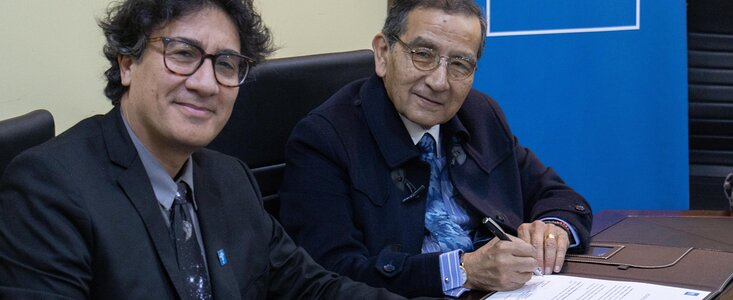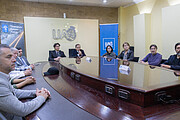Annuncio
ESO y Universidad de Antofagasta potenciarán intercambio académico y el desarrollo astronómico regional
28 Maggio 2024
El viernes 24 de mayo, el Observatorio Europeo Austral (ESO) y la Universidad de Antofagasta (UA) a través de su Centro de Investigación, Tecnología, Educación y Vinculación Astronómica (CITEVA), firmaron un convenio de cooperación para acercar sus comunidades científicas y potenciar el desarrollo de la astronomía de la Región de Antofagasta.
ESO opera el Observatorio Paranal, hogar del Very Large Telescope (VLT de ESO), el telescopio de luz visible más avanzado del mundo, y a finales de esta década, pondrá en operación el Extremely Large Telescope (ELT de ESO), el telescopio visible e infrarrojo cercano más grande del orbe, actualmente en construcción en cerro Armazones. La Universidad de Antofagasta es una de las principales universidades estatales de la zona norte de Chile y cuenta con estudiantes de pregrado y postgrado en astronomía en la zona.
El acuerdo fue firmado por Marcos Cikutovic Salas, rector de la UA, y Luis Chavarría Garrido, representante de ESO en Chile, en dependencias de la universidad. A la ceremonia también asistieron Bárbara Nuñez, encargada de asuntos regionales de ESO y Eduardo Unda-Sanzana, director de CITEVA, entre otros directivos de la UA.
“El mayor porcentaje de inversión de ESO en infraestructura de observación está puesto en la Región de Antofagasta, por lo cual es natural que nuestro principal socio estratégico sea la academia local. De esta sinergia es esperable generar desarrollo que beneficie a ambas instituciones y a la región en su totalidad”, señaló Bárbara Núñez, encargada de asuntos regionales de ESO.
"(Este convenio es) Un tremendo aporte, no solamente para las líneas de desarrollo institucionales, sino para un Centro de astronomía, en el cual tenemos cifradas grandes expectativas, ya que cuenta con programas de posgrado de Magister y doctorado, contribuyendo enormemente a la formación de capital humano avanzado en el área astronómica" dijo el rector Cikutovic tras la ceremonia.
Con la firma del acuerdo, se crea el Universidad de Antofagasta Day, un evento que se celebrará anualmente en las dependencias de las oficinas de ESO en Santiago. En esta actividad, el cuerpo académico, profesional y estudiantil, de los postgrados y pregrados que trabajen en proyectos del CITEVA, podrán presentar y compartir sus principales líneas de investigación y artículos al personal científico de ESO. Las oficinas de ESO en Santiago funcionan como un importante centro administrativo y científico, donde investigadores de todo el mundo, intercambian ideas con pares de Chile y Europa.
Además, ESO articulará visitas cortas de estudiantes de la UA a las dependencias de ESO en Vitacura. Adicionalmente, se entregarán todas las facilidades para que el cuerpo académico y estudiantil de la UA tenga acceso a los coloquios científicos organizados por ESO en sus dependencias de Santiago.
En el área de ingeniería, el convenio promoverá el intercambio entre personal de ambas instituciones. ESO dará acceso un día al año, a estudiantes y profesores de ingeniería o astronomía al Observatorio Paranal con fines educativos y motivacionales. En el marco de esta actividad, se facilitarán encuentros técnicos entre el personal de ESO y de CITEVA, con el objetivo de exponer los problemas o desafíos que el Centro enfrenta en el desarrollo de sus proyectos.
Links
Contatti
Francisco Rodríguez I.
ESO Media Relations Officer
Teléfono: +56 2 2463 3151
Correo electrónico: frrodrig@eso.org
Riguardo all'annuncio
| Identificazione: | annlocal24005-es-cl |
Our use of Cookies
We use cookies that are essential for accessing our websites and using our services. We also use cookies to analyse, measure and improve our websites’ performance, to enable content sharing via social media and to display media content hosted on third-party platforms.
ESO Cookies Policy
The European Organisation for Astronomical Research in the Southern Hemisphere (ESO) is the pre-eminent intergovernmental science and technology organisation in astronomy. It carries out an ambitious programme focused on the design, construction and operation of powerful ground-based observing facilities for astronomy.
This Cookies Policy is intended to provide clarity by outlining the cookies used on the ESO public websites, their functions, the options you have for controlling them, and the ways you can contact us for additional details.
What are cookies?
Cookies are small pieces of data stored on your device by websites you visit. They serve various purposes, such as remembering login credentials and preferences and enhance your browsing experience.
Categories of cookies we use
Essential cookies (always active): These cookies are strictly necessary for the proper functioning of our website. Without these cookies, the website cannot operate correctly, and certain services, such as logging in or accessing secure areas, may not be available; because they are essential for the website’s operation, they cannot be disabled.
Functional Cookies: These cookies enhance your browsing experience by enabling additional features and personalization, such as remembering your preferences and settings. While not strictly necessary for the website to function, they improve usability and convenience; these cookies are only placed if you provide your consent.
Analytics cookies: These cookies collect information about how visitors interact with our website, such as which pages are visited most often and how users navigate the site. This data helps us improve website performance, optimize content, and enhance the user experience; these cookies are only placed if you provide your consent. We use the following analytics cookies.
Matomo Cookies:
This website uses Matomo (formerly Piwik), an open source software which enables the statistical analysis of website visits. Matomo uses cookies (text files) which are saved on your computer and which allow us to analyze how you use our website. The website user information generated by the cookies will only be saved on the servers of our IT Department. We use this information to analyze www.eso.org visits and to prepare reports on website activities. These data will not be disclosed to third parties.
On behalf of ESO, Matomo will use this information for the purpose of evaluating your use of the website, compiling reports on website activity and providing other services relating to website activity and internet usage.
Matomo cookies settings:
Additional Third-party cookies on ESO websites: some of our pages display content from external providers, e.g. YouTube.
Such third-party services are outside of ESO control and may, at any time, change their terms of service, use of cookies, etc.
YouTube: Some videos on the ESO website are embedded from ESO’s official YouTube channel. We have enabled YouTube’s privacy-enhanced mode, meaning that no cookies are set unless the user actively clicks on the video to play it. Additionally, in this mode, YouTube does not store any personally identifiable cookie data for embedded video playbacks. For more details, please refer to YouTube’s embedding videos information page.
Cookies can also be classified based on the following elements.
Regarding the domain, there are:
- First-party cookies, set by the website you are currently visiting. They are stored by the same domain that you are browsing and are used to enhance your experience on that site;
- Third-party cookies, set by a domain other than the one you are currently visiting.
As for their duration, cookies can be:
- Browser-session cookies, which are deleted when the user closes the browser;
- Stored cookies, which stay on the user's device for a predetermined period of time.
How to manage cookies
Cookie settings: You can modify your cookie choices for the ESO webpages at any time by clicking on the link Cookie settings at the bottom of any page.
In your browser: If you wish to delete cookies or instruct your browser to delete or block cookies by default, please visit the help pages of your browser:
Please be aware that if you delete or decline cookies, certain functionalities of our website may be not be available and your browsing experience may be affected.
You can set most browsers to prevent any cookies being placed on your device, but you may then have to manually adjust some preferences every time you visit a site/page. And some services and functionalities may not work properly at all (e.g. profile logging-in, shop check out).
Updates to the ESO Cookies Policy
The ESO Cookies Policy may be subject to future updates, which will be made available on this page.
Additional information
For any queries related to cookies, please contact: pdprATesoDOTorg.
As ESO public webpages are managed by our Department of Communication, your questions will be dealt with the support of the said Department.


